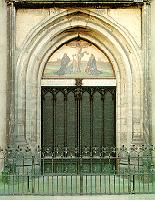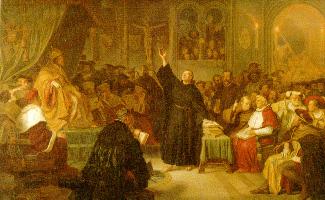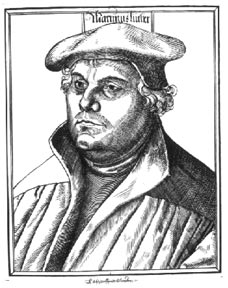About Me

- Name: T.B. Vick
- Location: Texas, United States
This site is devoted to theological and philosophical investigations of the spiritual meanings of life, current events, music, spiritual growth, nature, and learning to be attuned to listening to the 'language of God.' The name of this blog comes from one of Jonathan Edwards's journals which he called 'Shadows of Divine Things,' and later renamed 'Images of Divine Things.' As a Christian I am continously on a spiritual journey to grow more into the image of Christ, to understand what it means to be crucified with Christ. To seek the truths of the Christian Faith is of upmost importance, and to know that any truths that are found outside of Christianity are present there because they ultimately point to God. I have an M.A. in theology and apologetics and I completed one year of graduate studies in Philosophy at Marquette University.
Monday, October 31, 2005
Today is Reformation Day
 On October 31, 1517, Martin Luther nailed his 95 Theses on the doors of the Cathedral of Wittenberg, Germany. While this was a common practice for scholars and clergy to nail disputations to the Church door, what made Luther’s act so different can be attributed to two important factors.
On October 31, 1517, Martin Luther nailed his 95 Theses on the doors of the Cathedral of Wittenberg, Germany. While this was a common practice for scholars and clergy to nail disputations to the Church door, what made Luther’s act so different can be attributed to two important factors.First, the topic of the 95 Theses became quite controversial.
Second, several students of Luther’s took the 95 Theses off the Church door and had them translated from Latin into German (most all documents and disputations nailed to the Church doors were in written in the scholars language – Latin – and not the common vernacular) and then distrubuted them among the people. So everyone was able to read them and not just the scholars.
The practice of nailing disputations to the Cathedral door was quite common. This act was actually a way of formulating debate about issues, sending out notices regarding issues and theological doctrines, and simply allowing the scholars and clergy to communicate with one another (a type of midieval 'blogging' or 'e-mailing' if you will). So it was not unusual for Luther to actually nail his 95 Theses to the Church door.

(Above is the Cathedral Doors at Wittenberg Today)
The content of Luther’s 95 Theses was the practice of indulgences and the problems of doing so. However, this one act and this single disputation (the 95 Theses) set in motion a series of events that would change the course of history (especially Church history) altogether. Aside from the 95 Theses, Luther continued to write, as time progressed, about serious issues and problems which he thought the Roman Catholic Church needed to reform. These other works, along with the 95 Theses ultimately led Luther and certain Roman Catholic Church leaders to meet at what is now called The Diet of Worms.
 It was here that the Roman Catholic Church asked Luther if the writings that they had layed out on a table before him were his. But also, once he admitted that these works were his, the Roman Catholic Church leaders asked him to recant of them, and make public that he was in error regarding them. After Luther requested an extra day of thinking over what the Catholic leaders were asking of him, he decidely determined, and stated publically that he would not recant of his works.
It was here that the Roman Catholic Church asked Luther if the writings that they had layed out on a table before him were his. But also, once he admitted that these works were his, the Roman Catholic Church leaders asked him to recant of them, and make public that he was in error regarding them. After Luther requested an extra day of thinking over what the Catholic leaders were asking of him, he decidely determined, and stated publically that he would not recant of his works.
It was Luther's works, The Diet of Worms, and many supporters of Luther and his teachings which ultimately led to what we know today as the Protestant Reformation (of course what I have written above is very small thumb nail sketch of the start of the Reformation).
Sunday, October 30, 2005
Nicene Creed
We believe in one God the Father almighty, creator of all things visible and invisible. And in our Lord Jesus Christ the Son of God, the only begotten born of the Father, that is of the substance of the Father, God of God, light of light, true God of true God, born, not made, of one substance with the Father (which they call in the Greek "homousion"), by whom all things were made, which are in heaven and on earth, who for our salvation came down, and became incarnate and was made man, and suffered, and rose again on the third day, and ascended into heaven, and will come to judge the living and the dead. And in the Holy Spirit.
While this creed has changed a bit over the years, what is written above is the original form of this creed. Due to the debate between the Arians and their opposers (e.g. Athanasius), this paragraph was placed immediately after the creed:
But those who say: "There was [a time] when he was not," and, "Before he was born, he was not," and "Because he was made from non-existing matter, he is either of another substance or essence," and those who call "God the Son changeable and mutable," these the Catholic Church anathematizes.
Friday, October 28, 2005
Thursday, October 27, 2005
Are People Basically Good? (Introduction)
There are several reasons why I think that people are not basically good. But before I explain myself, it should first be asked what is meant by ‘good.’ If ‘good’ is relegated to merely human standards then, yes, people can be good. By saying people can be good, I mean that people can and do perform acts of kindness and the like that would be considered good according to societal standards. For instance, feeding the homeless, helping a little old lady across the street, doing something for someone who is not able to do what you did for them, etc. These are acts of kindness and are good according to human standards. But by doing these things, does that make that person good? Yes. But once again the standard is human (e.g. society based standards of goodness or individual goodness that is generally agreed upon by a majority of sane people).
However, if by good, the standard is perfection, then how could anyone say people are basically good? No one admits to being perfect. Therefore, if by good one means that one would have to be perfect then no one actually is good. But who is asking anyone to be perfect? Well, actually, God is (see Matthew 5:48).
Let’s actually set God’s standard aside (although I think it is the ultimate standard of judgment) for a minute and illustrate a general ‘goodness’ that most seem to think is inherit in people. If people are basically good, then why do some commit acts of evil? Now there’s a question that has been tried by some of the best thinkers in history (e.g. Immanuel Kant focused much of his ethical theory on this very question). I actually posed this question to the lady I was discussing these issues with and her response was that they were influenced by certain factors that caused then to commit those evil acts.
That being the case, then she believed that external factors caused the act through the person. Now this begs this question, are these people culpable for their acts? The responsibility, in her answer, seems to fall only on external factors. However, this certainly does not hold up in a court of law, even the ‘insane’ are found guilty and punished for their actions. So to respond to her comment, I presented her with this illustration.
Take an infant for example. A child that is about three or four years old at the most.
 When a child that age is caught doing something wrong, and the parent sees the child perform the wrong doing, for instance taking a cookie from the cookie jar when the child is not suppose to do that, what happens? The parent asks the child, “Did you just take that cookie from the cookie jar when you know you are not supposed to.” In response, the child lies and says, “No.” Did the parent teach that child to lie? No sane person would teach their child to lie. So how did the child know to lie? My response is that the child does not lie instinctively due to external factors influencing the child. Most children that age are not exposed to such things that would cause them to perform an act such as lying at the age of three. So where does this ‘wrongness’ come from? I believe that child is conceived in sin and therefore lying comes natural to the child. This response actually shocked the person I was conversing with. She could not believe that I could believe such a thing?
When a child that age is caught doing something wrong, and the parent sees the child perform the wrong doing, for instance taking a cookie from the cookie jar when the child is not suppose to do that, what happens? The parent asks the child, “Did you just take that cookie from the cookie jar when you know you are not supposed to.” In response, the child lies and says, “No.” Did the parent teach that child to lie? No sane person would teach their child to lie. So how did the child know to lie? My response is that the child does not lie instinctively due to external factors influencing the child. Most children that age are not exposed to such things that would cause them to perform an act such as lying at the age of three. So where does this ‘wrongness’ come from? I believe that child is conceived in sin and therefore lying comes natural to the child. This response actually shocked the person I was conversing with. She could not believe that I could believe such a thing?Why? It is an empirical fact that people perform evil/bad acts. I see it every day. What needs to be asked at this point is . . . is anything bad? Everyone would agree that these things are bad/evil: lying, cheating, theft, murder, rape, child molestation, child abuse, etc. We can list a whole host of evil/bad things that people do. If people are basically good, then why do they perform such things?
Since this conversation I have been contemplating these questions and others in my mind. So, I am hoping to get some my thoughts and answers down on paper and will post them here in the next few weeks in an attempt to get answers and spark conversation. If you are reading this I would really like to hear some of your responses to all these things so please feel free to post any comments.
Monday, October 24, 2005
I See God In Everything
 No, I am not a pantheist. And, I do not worship nature. But, I agree with what the Apostle Paul wrote in his letter to the Roman Church:
No, I am not a pantheist. And, I do not worship nature. But, I agree with what the Apostle Paul wrote in his letter to the Roman Church:“For since the creation of the world, His invisible attributes, His eternal power and divine nature, have been clearly seen, being understood through what has been made . . .” (Romans 1:20)
The other morning I was looking through our back sliding glass door, which consequently has a mirror tint on the outside of the glass so in the daytime it is impossible to see inside our living room from the outside of that door. As I was looking out I saw several Blue Jays playing around in our backyard (these are my favorite birds). Seeing these birds immediately made me smile, and just then I realized that God made these creatures for man to enjoy, and that by my seeing these birds, He was glorified in His creation.
I see God in . . .
The laughter of children at play
The noise of the wind as it blows through the trees
A dog barking in the distance
The sound of birds chirping
The blueness of the sky
The whiteness of the clouds
The rain as it falls and hits the earth
The smell of autumn leaves falling from the trees
These are all a part of His creation, for our enjoyment, that we might be directed to His glory.
Ad Majorem Dei Gloriam
Quote of the Week

“The best, most beautiful, and most perfect way that we have of expressing a sweet concord of mind to each other, is by music. When I would form in my mind an idea of a society in the highest degree happy, I think of them as expressing their love, their joy, and their inward concord and harmony and spiritual beauty of their souls by sweetly singing to each other.”
---- Jonathan Edwards
Sunday, October 23, 2005
A New Experience
My wife and I were both raised Southern Baptist, but as we grew theologically we slowly developed more toward Presbyterianism (PCA). We are currently adrift as far as a church home and have been searching for the last month or more.
Of course, there are specific theologies we want in a church, but just as much we want to find a place where we can both serve. We have always been active participants in all the other churches where we have been members. Anyway, while we will probably not attend St. Alban's again, I did enjoy the experience and the service.





